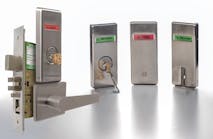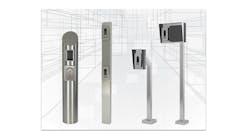The typical commercial locksmith is skilled at problem-solving and has high levels of technical knowledge and mechanical aptitude. On the job, they have the tools and training to secure almost any opening. But first, that locksmith has to get their foot in the door.
Unfortunately, the skills that pay off out in the field are quite different from the skills necessary to win new and repeat business. To grow a business, you have to get your name and credentials in front of potential customers. Here are a number of free or almost-free things you can do:
Be active in the community. Participate in civic organizations, such as your local chamber of commerce. These events are a great way to network with fellow business owners who might want your services. Pass out business cards and offer to visit their site and perform a complimentary security assessment. The goal here is to win new commercial accounts, which potentially generate valuable referrals and repeat business.
Spread the word, any chance you get. Talk to folks at a school event, Little League games and at your favorite coffee shop. Locksmith Ledger contributing editor Steve Young has found new customers while waiting in line at the grocery, simply by noticing a broken key and striking up a conversation. Residential upgrades or lockout calls are often one-time events, and potential customers are more likely to call if they’ve met you, heard your name, driven by your shop or seen your vans on the road.
Google yourself on a regular basis. Make sure that your information shows up correctly online when you search for your company name. Google “Locksmiths near me” to see what potential customers are viewing.
Update your website periodically. Make sure visitors are aware of all the services you offer. Consider posting monthly promotions, which can be anything from a free inspection to discounts or value-added services. (Google algorithms change often and are difficult to predict, but search-engine results seem to favor active websites over static ones.) And make sure your contact information is front and center — and accurate.
Use social media. You don’t have to spend tons of time or post crazy dance moves on TikTok. Just make sure you have a presence on Facebook and LinkedIn, at a minimum. Create company pages and be sure the “About Us” information includes your address (if you have a retail shop), phone number, services offered and a link to your website. Facebook is ideal for sharing photos from recent jobs. LinkedIn is best for connecting with commercial clients and your colleagues and suppliers. With both, check and respond to messages regularly. (Please follow Locksmith Ledger on Facebook and connect with us on LinkedIn.)
Consider referral sites. You might want to list your business on local and regional referral sites, such as Angie’s List, HomeAdvisor and Thumbtack.com. Include information, such as professional designations and years in business, to help differentiate your business from the telephone bank startups. List your company on ALOA’s findalocksmith.com website.
Monitor reviews. A visible negative review from an unhappy or unreasonable customer is bad for business. It’s free to “claim your business” on Yelp.com and then receive notifications of reviews. Even without claiming your business, you can search and see what’s posted about your company.
Take action if a negative review is front and center. Contact the customer and see whether the issue can be resolved and they would be willing to remove or edit the review. If the review is untrue, contest it and add a statement at the bottom about how you’ve tried to solve the problem. Another strategy is to solicit good reviews from happy customers and share them on social media.
These are all relatively simple, common-sense steps to help to get you noticed. For more in-depth information, we run a series of business management articles in our magazine, covering topics such as sales techniques, inventory management, business software and generating recurring monthly revenue.
— Emily Pike





